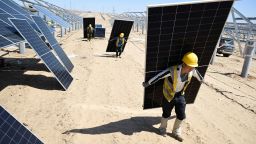URGENT UPDATE: The United States has officially withdrawn from the pivotal COP30 climate summit, set to occur in Belém, Brazil, this November 2023. This decision, made by the Trump administration, effectively sidelines America from critical climate negotiations, granting a significant advantage to China on the global stage.
The recent elimination of the State Department’s Office of Global Change has left the US without a formal presence at one of the most consequential climate summits in a decade. As a result, even lawmakers who typically attend have reportedly failed to secure their accreditations, underscoring the urgency of this developing situation. Experts fear that the US absence may embolden wealthier nations to retreat from their climate commitments, thereby jeopardizing progress in combating climate change.
“This is a dangerous vacuum,” warned Harjeet Singh, a veteran climate advocate. He criticized the US for “abandoning its responsibilities in the midst of a planetary emergency.” With COP30 poised to shape the global climate agenda for the next decade, the stakes could not be higher.
China is ramping up its efforts in clean energy while the US shifts back toward fossil fuels. According to climate scientist Joeri Rogelj, “China’s voice will be heard more loudly at COP30,” as they emphasize growth in green technologies as a cornerstone of their economic strategy. The Chinese Ministry of Foreign Affairs has stated that climate change is a “common challenge faced by mankind,” adding that “no country can stay out of it.”
The US, historically a leader in climate negotiations, now risks losing its role in shaping global climate policy. The implications of this shift are profound: China’s advancing clean energy initiatives, including the construction of 510 gigawatts of new solar and wind capacity, position it as a formidable competitor. In contrast, the US is dismantling its renewable energy infrastructure, focusing instead on expanding fossil fuel extraction.
As nations prepare to submit their climate goals by September, experts are closely watching China’s response. With a history of setting low targets, analysts predict China may propose modest pollution cuts, potentially undermining the ambitious goals initially set by the US under the Biden administration.
The ripple effects of the US withdrawal extend beyond immediate negotiations. Without American pressure, there is concern that China may not feel compelled to take meaningful action towards its climate commitments. Chiara Martinelli of Climate Action Network Europe noted that the lack of US involvement could lead to a “license to backtrack” for other wealthy nations.
As COP30 approaches, all eyes are on China and its forthcoming goals. The country’s track record indicates it could under-promise and over-deliver, a tactic that might further solidify its leadership role in the global climate arena. However, as Todd Stern, former US climate envoy, pointed out, a robust commitment from China is crucial for global momentum in climate action.
The world is watching as the effects of this significant geopolitical shift unfold. With the US stepping back, the question remains: will China seize this opportunity to lead the charge against climate change or fall short of expectations? The urgency of the situation cannot be overstated—COP30 will be a watershed moment for international climate diplomacy.






































































